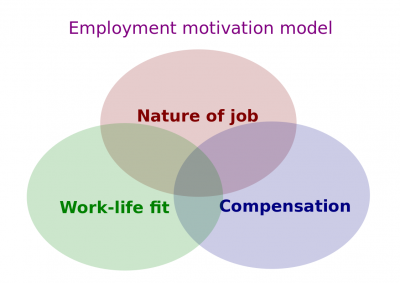Difference between revisions of "What Employment Is"
(→Script) |
(→Script) |
||
| Line 15: | Line 15: | ||
:[[Employment]] is an [[agreement]] between at least two parties, one of which is an [[employer]] and another is an [[employee]]. The ''employer'' compensates the ''employee'' for his or her work time. The ''employee'' agrees to follow the ''employer's'' directions during work hours in exchange for the [[employee compensation]]. The [[employee compensation]] most commonly includes money called [[salary]] or [[wages]]. | :[[Employment]] is an [[agreement]] between at least two parties, one of which is an [[employer]] and another is an [[employee]]. The ''employer'' compensates the ''employee'' for his or her work time. The ''employee'' agrees to follow the ''employer's'' directions during work hours in exchange for the [[employee compensation]]. The [[employee compensation]] most commonly includes money called [[salary]] or [[wages]]. | ||
| − | :An ''employer'' usually hires an ''employee'' to deliver some increments that the ''employer'' sells to the [[customer]]s. | + | :An ''employer'' usually hires an ''employee'' to deliver some increments that the ''employer'' sells to the [[customer]]s. Routinely, the ''employer'' collects money from the ''customers'' and pays the ''employees'' for the delivered work. |
:The [[employment motivation model]] demonstrates what motivates people to be hired. In order to work, an ''employee'' needs to be comfortable with three things. The first is the nature of job itself, the second is the ''job's compensation'', and the third is so-called [[work-life fit]] or job's fit to employee's life. | :The [[employment motivation model]] demonstrates what motivates people to be hired. In order to work, an ''employee'' needs to be comfortable with three things. The first is the nature of job itself, the second is the ''job's compensation'', and the third is so-called [[work-life fit]] or job's fit to employee's life. | ||
Revision as of 19:00, 3 May 2020
What Employment Is (hereinafter, the Lectio) is the second lesson part of the Employment Essentials lesson that introduces its participants to employment and related topics.
This lesson belongs to the Introduction to Employment session of the CNM Cyber Orientation. The Orientation is the second stage of the WorldOpp Pipeline.
Contents
Content
The predecessor lectio is Options for the Graduates.
Key terms
- Employment. In the workspace, employment is an agreement between an employer, who agrees to compensate an employee in exchange for his or her work time, and an employee, who agrees to follow the employer's directions during work hours in exchange for the employee compensation, as well as a process and/or result of that exchange.
- Employment motivation model. A framework for analyzing employment motivation that identifies three domains that contribute to the motivation to work. These domains include the job itself, its compensation, and its fit to one's life.
- Work-life fit.
Script
- Employment is an agreement between at least two parties, one of which is an employer and another is an employee. The employer compensates the employee for his or her work time. The employee agrees to follow the employer's directions during work hours in exchange for the employee compensation. The employee compensation most commonly includes money called salary or wages.
- An employer usually hires an employee to deliver some increments that the employer sells to the customers. Routinely, the employer collects money from the customers and pays the employees for the delivered work.
- The employment motivation model demonstrates what motivates people to be hired. In order to work, an employee needs to be comfortable with three things. The first is the nature of job itself, the second is the job's compensation, and the third is so-called work-life fit or job's fit to employee's life.
- How does it work? The writer of this very text created this because this person (a) liked writing; the writer surely liked the job itself, (b) was satisfied with the amount of money paid for this job or employee compensation, and (c) wrote these lines from home when it was convenient. That was the best case scenario; however, the ideal combination of all the three rarely happens.
Work Sellers is the successor lectio.

